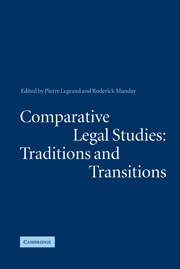Book contents
- Frontmatter
- Contents
- List of contributors
- Introduction
- Comparative legal studies and its legacies
- Comparative legal studies and its boundaries
- Comparative legal studies and its theories
- 8 The question of understanding
- 9 The same and the different
- 10 The neo-Romantic turn
- 11 The methods and the politics
- Comparative legal studies and its futures
- Conclusion
- Index
8 - The question of understanding
Published online by Cambridge University Press: 18 December 2009
- Frontmatter
- Contents
- List of contributors
- Introduction
- Comparative legal studies and its legacies
- Comparative legal studies and its boundaries
- Comparative legal studies and its theories
- 8 The question of understanding
- 9 The same and the different
- 10 The neo-Romantic turn
- 11 The methods and the politics
- Comparative legal studies and its futures
- Conclusion
- Index
Summary
Comparatists love to wail about the state of their discipline. To read contemporary comparative legal literature is, therefore, to witness a pitiful series of testimonials about the alienation of the comparatist. The discipline of comparative law, it seems, is marginalized in any number of ways. Thus, ‘[w]e comparative lawyers often complain that our colleagues see our work as peripheral.’ Comparative law ‘has enjoyed so little prestige in the inner circles of the academy’. This ‘marginal status’ of the discipline results in, and is reflected by, the lack of ‘full-time comparative law scholar[s] on the faculty’ of a distressingly large number of prestigious US law schools. Even within the US law-school curriculum, the discipline is but ‘a subject on the margin’.
In order to remedy this apparent marginalization, comparatists have argued repeatedly for the adoption and deployment of some form of ‘theory’. According to Ugo Mattei and Mathias Reimann, comparative law exhibits ‘a lack of methodological reflection and theoretical foundation’. In the dialogue between Pierre Legrand and John Merryman, the former decries ‘the poverty of legal theory in the comparative field’, while the latter simply notes: ‘I do not know of anyone who has done substantial theoretical work addressed to what comparative law really is about.’ This theoretical imperative has been promoted in many forms. If comparatists could only develop and deploy the proper methodology – whether functionalist, economic, philosophical, cultural or otherwise – comparative law would, it seems, find its rightful place as a discipline.
- Type
- Chapter
- Information
- Comparative Legal Studies: Traditions and Transitions , pp. 197 - 239Publisher: Cambridge University PressPrint publication year: 2003
- 4
- Cited by



